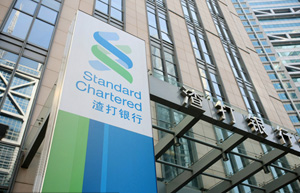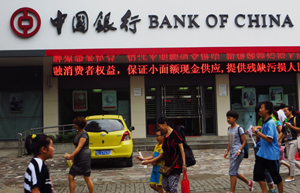Chinese banks are selling asset-backed securities at a rapid pace as they seek to offset a slump in deposits, prompting analysts to warn of the risks of these instruments, which sparked the global financial crisis.
Lenders in the world's second-biggest economy have issued 148.7 billion yuan ($24.2 billion) in collateralized debt obligations this year, Bloomberg data showed. The central bank and the finance regulator both must approve such issues, which take assets off balance sheets for accounting purposes, allowing lenders to seek more business without breaching regulatory limits.
China is experimenting with new types of securities at a time when deposits are dropping at a record pace and soured debt is rising amid a property slump. Nonperforming loans rose to the highest in five years in June as China Construction Bank Corp and Bank of China Ltd reported sluggish profit growth.
"Because most asset-backed securities investors are banks, securitization doesn't help lower the lending risks the whole banking system is exposed to," said Li Ning, a bond analyst in Shanghai at Haitong Securities Co Ltd, the nation's second-biggest brokerage. "The risks one bank issuer faces are simply transferred to the bank investor."
Premier Li Keqiang is seeking to shift financing to official channels after shadow-banking assets jumped 32 percent in 2013 to 38.8 trillion yuan, according to Barclays Plc estimates. The banking regulator tightened rules on new trust products in April, after failures of such investments sparked protests. Authorities approved the first asset-backed securities eligible to trade on the Shanghai Stock Exchange in June, and in July they authorized the first mortgage-backed notes since 2007.
Asset-backed securitization, in which lenders package loans into collateral for note sales, can help banks make room on their balance sheets for new lending. The practice has attracted global regulatory focus since the 2008 financial crisis, when loans to subprime home-buyers in the United States went bad. China resumed approvals in 2012 after a four-year halt.
Two calls to the central bank's press office were not answered. An official at the China Banking Regulatory Commission's press office, who would not be identified, declined to comment. A fax sent to the CBRC seeking comment on the risks of asset-backed securities was not immediately replied to.
The notes are being sold in the interbank market, which is comprised of banks and insurers, according to Jerome Cheng, senior vice-president and structured finance analyst at Moody's Investors Service Inc in Hong Kong.
"One bank repackages its loan portfolio and sells to another bank. But the risk may still be within the banking system," Cheng said. Such sales will be more prominent among smaller city commercial banks.
"It's not the product that's a problem it's how you utilize it," Cheng said. "Government officials on various occasions have mentioned they want to see the growth of the securitization market to help economic reform and to channel funding to under-served sectors."
|
 |
 |
| Standard Chartered offshore RMB index rises slightly in July | BOC issues RMB bonds in Taiwan |
